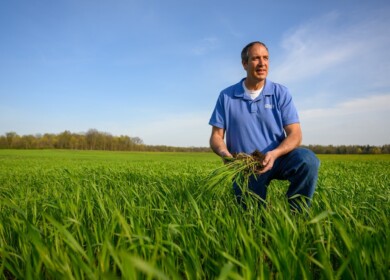University of Illinois study questions nitrogen use in soybean farming

Researchers at the University of Illinois Urbana-Champaign have published new findings that question the benefit of using nitrogen fertilizer on modern high-yielding soybean varieties. Their study, appearing in the journal Crop, Forage & Turfgrass Management, indicates that additional nitrogen fertilizer provides limited yield improvements, and often does not justify the associated costs.
Soybeans naturally collaborate with bacteria to fix atmospheric nitrogen, which traditionally satisfies their growth requirements. However, with the increasing yield potentials of new soybean varieties, some agricultural experts speculated that additional nitrogen might be needed. “Ongoing genetic improvements have certainly boosted soybean yield potentials, prompting us to examine whether additional nitrogen fertilizer would be beneficial,” stated Emerson Nafziger, professor emeritus in crop sciences.
The research team conducted field trials across Illinois from 2014 to 2017 to evaluate the effects of nitrogen application at various growth stages of soybeans. They discovered that while applying nitrogen at all stages did increase yields, the gains were marginal and often not cost-effective. “The cost of applying nitrogen two to three times outweighs the benefits from the yield increase,” Nafziger explained, advising against such practices for typical farming operations.
An exception was noted in specific soil conditions and planting situations. In a loam soil in Chillicothe, Illinois, a single application of nitrogen at planting significantly improved yields in two of the three years studied. This effect was attributed to the soil’s texture and organic matter content, which are less conducive to early plant growth. Additionally, in one instance, this early nitrogen application appeared to mitigate symptoms of sudden death syndrome, a fungal disease, though it is not advised as a reliable disease control method.
The study concludes that while nitrogen can aid early growth in certain conditions, for most Illinois farms, the natural nitrogen-fixing ability of soybeans combined with the activity of free-living soil bacteria provides sufficient nitrogen. Nafziger emphasized, “For high corn yields, nitrogen is essential, but soybeans can achieve high yields without the additional cost and environmental impact of applying nitrogen fertilizer.”
This research adds to a growing body of evidence suggesting that the traditional reliance on the biological nitrogen-fixing abilities of soybeans remains largely justified even as yield potentials increase.
Enjoyed this story?
Every Monday, our subscribers get their hands on a digest of the most trending agriculture news. You can join them too!















Discussion0 comments